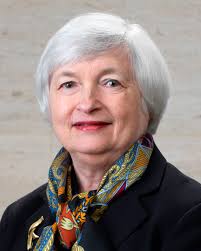Janet Yellen [1946-0] American    
Rank: 102
Public Servant, Economist
Janet Louise Yellen is an American economist. She is the Chair of the Board of Governors of the Federal Reserve System, previously serving as Vice Chair from 2010 to 2014. Business, Faith, Finance, Independence, Knowledge |  |